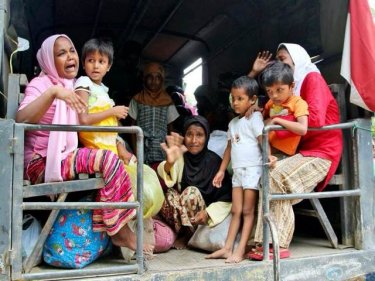Over the past few years, the world has witnessed the suffering and violence that people on these journeys have endured at the hands of smugglers and traffickers.
At this crucial time, we recall the obligation of governments to rescue and protect refugees and migrants stranded at sea.
On May 21, during a trinational meeting between Indonesia, Malaysia and Thailand, the governments of Indonesia and Malaysia agreed to allow people then stranded on boats at sea to disembark in their respective countries.
Subsequently, on May 29, 2015 the Royal Thai Government hosted an intergovernmental Special Meeting on Irregular Migration in the Indian Ocean.
APRRN commends the Royal Thai Government and other governments in the region for taking a step towards addressing the issue of migrants and refugees by hosting this meeting.
Civil society regards this meeting as a promising first step by governments within the Asia Pacific region towards developing long-term, sustainable and durable solutions to address movements by sea for those escaping poverty and/or persecution.
As was publicised after these meetings, civil society is pleased that governments have acknowledged the need to intensify search and rescue operations to ensure the safety of migrants and refugees at sea.
However, the pledges made on May 29 are not longstanding commitments but were rather a one-time offer.
Additionally, the exploration of disembarkation options and reception arrangements has encouraged civil society that government officials are taking initial steps towards the sustained protection of rescued persons.
Despite such positive commitments by states, civil society is disappointed in not only the weak initial commitments, but also the inadequacy of tangible actions undertaken by governments in the four months following the meeting in May.
Refugees, including women and children, are still being detained in Malaysia and Thailand in woefully overcrowded and inhumane conditions.
There is also concern over the fact that a taskforce to respond to the movement of refugees and migrants in the region, promised at the Asean Ministerial Emergency Meeting on Transnational Crime Concerning Irregular Movement of Persons in Southeast Asia on July 2, 2015, is yet to be established.
Furthermore, the meeting on May 29 did not adequately address the ongoing persecution of the stateless Rohingya in Myanmar, nor the root causes of their discrimination.
Their persecution has continued unabated for many decades with sectarian violence against the Rohingya being met with impunity.
Sectarian violence in 2012 resulted in more than 130,000 people confined and segregated to IDP camps with limited humanitarian assistance and livelihoods.
Disenfranchisement among the Rohingya community has only continued to increase with the cancellation of the ''Temporary Registration Certificates'' on March 31, 2015 denying them the right to vote and the disqualification of Rohingya candidates in the coming national elections.
States must address the root causes of movements at sea, otherwise the Rohingya will continue to flee from Myanmar and Bangladesh in search of safety and dignity.
All states have an obligation to protect people in the region in need of assistance, regardless of their mode of transportation.
APRRN strongly urges all states within the region to:
1. Ensure that people on boats are allowed to disembark at shore and are not pushed back to sea;
2. Strengthen search and rescue operations in the Andaman Sea and Bay of Bengal;
3. Ensure a robust screening mechanism to identify people with protection needs;
4. Provide people rescued at sea with immediate access to humanitarian assistance, especially vulnerable women and children;
5. Immediately cease detaining people with protection concerns and explore options for alternatives to detention;
6. Provide people in need of protection with access to fair and robust asylum procedures;
7. Continue to actively develop regional and national solutions that address the root causes of refugee and migrant outflows.
About APRRN
The Asia Pacific Refugee Rights Network (APRRN) is an open and growing network consisting of more than 200 civil society organisations and individuals from 26 countries committed to advancing the rights of refugees in the Asia Pacific Region. We do this through information sharing, mutual capacity building, and joint advocacy. APRRN members are diverse, including service providers, human rights advocacy groups, research institutions, law firms providing pro-bono legal aid, refugee community-based organisations and refugees themselves. Almost all APRRN members are civil society groups working in their specific local contexts, lobbying their governments for changes in policies and legislation to protect the rights of refugees.





There must a reason why no country wants these people, even their place of birth.
Posted by Hi on October 13, 2015 03:34
Editor Comment:
Self-interest, irrational fear, racism, intolerance, unreasonable hatred. Take your pick.